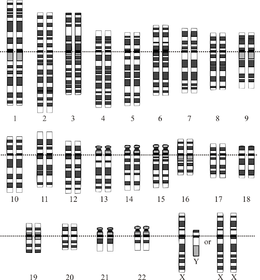As we enter 2022, a new year, it is common to find ourselves full of hopefulness for the future. As we leave last year behind, we may also find ourselves reflecting on the past. Since 1933, cancer has held the position of the second leading cause of death in the U.S. As predicted by the National Library of Medicine, specialists anticipate 1,918,030 cancer diagnoses to take place in 2022, with 609,360 expected to take the lives of those affected. Despite these tragic numbers, deaths related to cancer in both men and women decreased by 32% between 1991 and 2019. With upcoming medical milestones paving the path, it seems we live in a time when the risk of dying from cancer is rapidly declining.
In lieu of the new year, City of Hope analyzed a few oncology advancements we can expect to see flourish this year. Let’s dive into three anticipated trends for cancer treatment in 2022.
1. Genetic Testing as the “Future of Oncology”

Figure 1: Karyotype, Human Genome Source: Wikipedia.org
In 2003, scientists discovered how to create personalized therapy for cancer patients based on the individual’s genetic information—the human genome. This allows doctors to analyze a person’s tumor and design a patient-specific therapy route focused on targeting particular mutations. As genetic data continues to identify new mutations, “we’re seeing a much broader number of patients with mutations who don’t classically fit current models,” stated Dr. Stacy Gray of City of Hope’s new Director of Clinical Cancer Genomics. This discovery only emphasizes the importance of personalized patient care.
One of the incredible benefits of genetic testing is that doctors can analyze a patient’s DNA with or without a cancer diagnosis. This allows physicians to identify risk factors and provide patients with treatment protocols to prevent disease development. Dr. Gray also stated, “Right now there are hundreds of thousands of people at high risk for cancer who don’t know it. Tens of thousands who could benefit from targeted therapies, but won’t get them.” As asserted by the American Cancer Society, as cancer rates have dropped significantly for both men and women, “some of this drop appears to be related to an increase in the percentage of people with lung cancer who are living longer after diagnosis, partly because more people are being diagnosed at an early stage of the disease.” It is essential to discuss the significance of genetic testing because detecting cancer in its early stages can prevent potential pain, suffering and death worldwide.

Figure 2: Dr. Stacy Gray Source: City of Hope
2. Improved Diversity in Clinical Trials

Figure 3: Angela L. Talton Source: City of Hope
City of Hope has recognized a diversity problem within its walls. The medical center noted a need for increased effort in ensuring people of different races, ethnicities, sexual orientations and ages gain representation in clinical research. Angela L. Talton, Senior Vice President and Chief of Diversity at City of Hope, stated that in 2022, “Our clinical and research scientists are conducting studies on health disparities within diverse communities and helping us find the best ways to address complex health issues, including diversity in clinical trials.” An individual’s background contributes to various environmental, physical and genetic factors that can allow diseases to differ between patients. City of Hope is looking at a long list of cancers, such as breast, prostate and colon cancer, as well as how they act amongst diverse populations.
As discussed by FierceBiotech, other entities are also striving to improve patient diversity in research. Novartis dedicated $5 million to historically Black universities and $13.7 million for medical trials to three research centers at Morehouse School of Medicine. The U.S. Food and Drug Association has also acknowledged the lack of diversity in the healthcare system. In the summer of 2021, the Agency “rejected Incyte’s PD-1 drug for anal cancer after the agency’s advisers cited lack of diversity as one reason for its vote of no confidence in the med” (Fierce Biotech). Similarly, Eli Lilly identified diversity issues explicitly related to its oncology trials. The company noted that it recognizes its clinical trials were previously composed of 11.5% Black patients while their studies within other disease spaces included 39%. The company is now expanding community partnerships to increase minority enrollment in its trials.
3. Targeted Immunotherapies
Oncologists can now identify genetic abnormalities within cancer patients and use specific immunotherapies to target each patient’s tumor. CAR T cell therapy is a process that allows specialists to manipulate “a patient’s immune cells to attack cancer, [and] is a true breakthrough in immunotherapy” (City of Hope). The therapy is FDA approved and is a featured program at City of Hope. The medical center is treating over 600 patients with around 50 ongoing/impending trials that will target cancers of the immune system and blood.

Figure 4: KEYTRUDA Rx Source: MPR
Additionally, pembrolizumab (Keytruda), an immune checkpoint inhibitor drug that directly combats protein PD-L1, is greatly enhancing the immunotherapy industry. PD-L1 is an immune system blocking protein that can appear at a 90% concentration rate within cancer cells. This allow pembrolizumab to target it efficiently. This drug will be revolutionary in treating various cancers, including lung, endometrial, esophageal and kidney cancer.
2022 will be an exciting year for oncology, and this year holds great potential to continue to reduce cancer-related deaths. With significant steps taken to increase early detection through genetic testing, diversity within clinical trials and research, immunotherapies such as CAR T cell therapy and monumental drug discoveries, we can remain hopeful for the future of oncology.
At Gilmartin, our biotech focused team has helped a number of oncology companies translate their story to the investment community. Contact our team today to learn more about how we can help you and your company communicate its story amongst a crowded biotech environment!
Rachel Mahler, Analyst

Leave a Reply